Many of you know that I recently returned to the United States after 17 months living with my wife and two daughters in Cuenca, Ecuador. I can’t yet judge the full impact of this amazing experience, but I did want to share and record some insights, experiences, and lessons that are fresh on my mind one week after my return.
Not all of you have the desire to travel or live abroad like my wife and I did. And that’s ok. This is just how we choose to use the financial freedom we’ve found.
But I hope my own experience will inspire you to keep pursuing your own personal dreams, whatever they are. Because doing what matters is the theme of this site. And real estate investing and personal finance are just a powerful vehicles to help get you there.
So in no particular order, here are my 17 insights from 17 months living abroad with my family.
1. People Are People
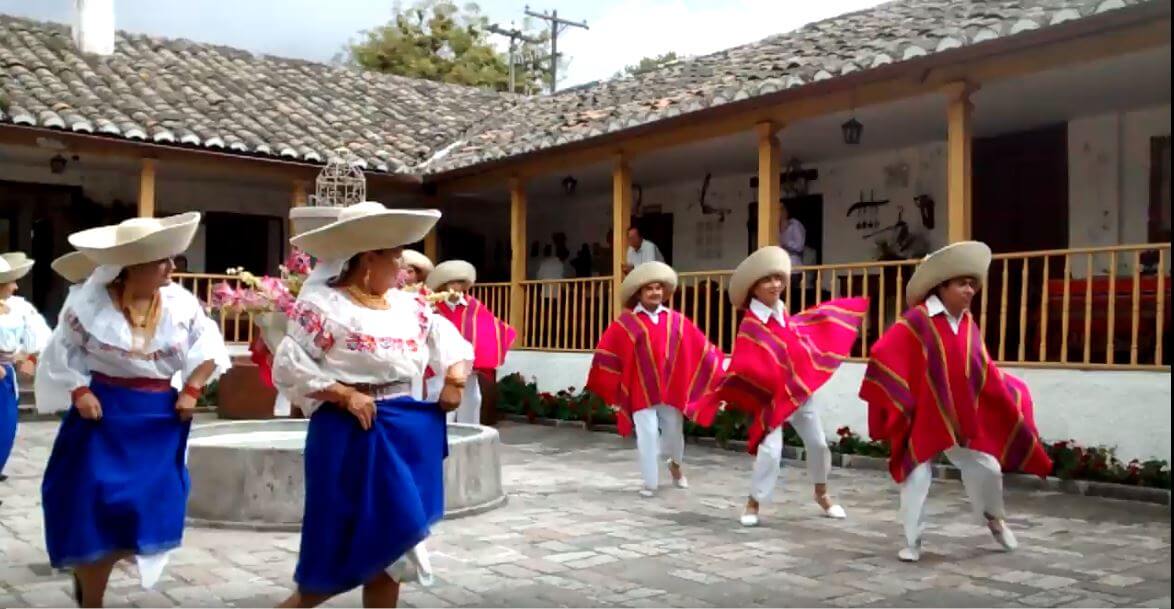
When we arrived in Ecuador, the differences initially jumped out. People ate different foods, wore different clothes, and had different customs. The sounds and smells of the cities and towns we visited were foreign and unusual to us.
But after 17 months living there, what stood out more were the similarities. People are people.
- Mothers and fathers still play with their babies, trying to make them smile.
- Kids play on playgrounds and chase one another around.
- Loved ones die and their family and friends mourn their loss.
- Parents want the best for their children and hope they’ll grow up to be safe and healthy.
The many similarities were encouraging. They made us feel at home and like a part of a larger, human community.
2. Guinea Pigs Don’t Have a Lot of Meat
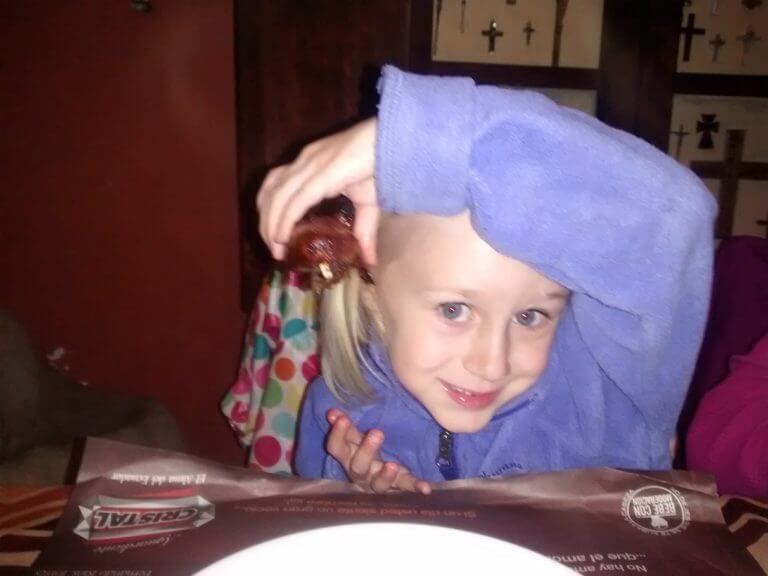
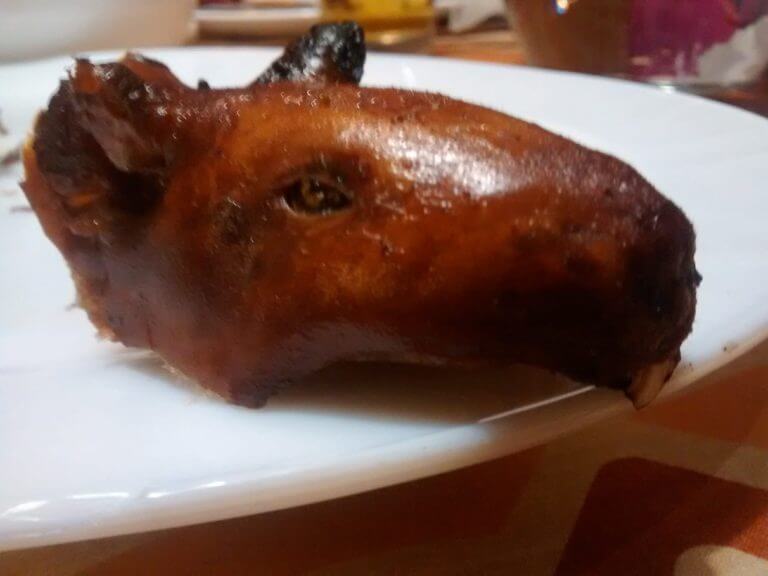
Most of the Ecuadorians we met loved eating roasted guinea pig (in Spanish it’s called cuy). Yes, it’s the same animal many Americans cherish as a furry pet. Like back-yard barbecues in the U.S., no traditional holiday celebration in Ecuador is complete without roasting a few of these cute animals.
Of course, we tasted the darling little rodents as well. The flavor was ok. I think it could grow on me over time.
But as you might guess, there’s NOT a lot of meat. It gave me a new appreciation for the term baby back ribs!
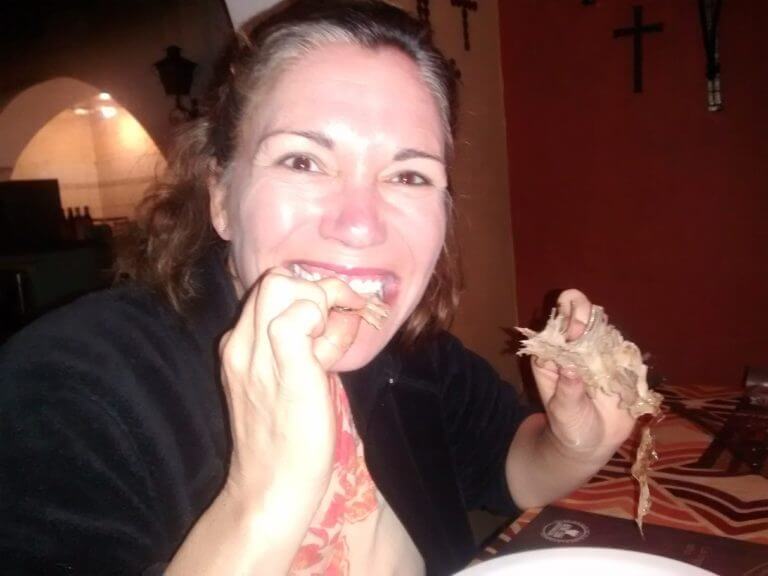
3. A Simple Life = A Good Life
In 2016 we spent about 12 months detaching ourselves from our normal lives in order to take this trip to Ecuador. It was this exercise in simplification that ultimately bought us our freedom.
Before leaving I was on two non-profit boards and my town’s planning commission. I co-owned three businesses, and managed dozens of properties. My wife had many commitments of her own. And of course we kept busy with our young children.
Our lives were hectic, probably like many of yours.
But in Ecuador, it was the complete opposite.
Yes, we kept ourselves occupied. But life was relatively simple.
We took our girls to school, worked on creative projects (writing for me, teaching English for my wife), ate slow meals together, exercised, played sports, and spent time with friends.
This simple schedule full of rich experiences was amazing. It redefined our idea of the good life.
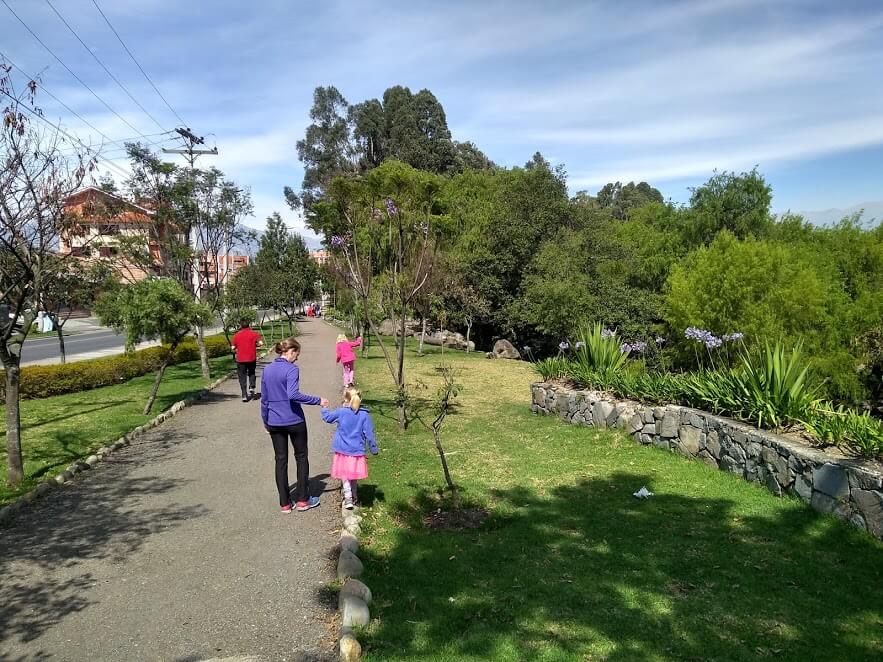
4. You Don’t Need a Good Reason For Parties or Fireworks
Did you know that you don’t have to wait until New Years Eve or the 4th of July to shoot fireworks and have parties?! In Ecuador it seemed like every other weekend was some of festival or fiesta. And this meant shooting off fireworks in large numbers.
We soon learned to embrace the fun, dance more often, savor time with friends, and enjoy the fireworks show.
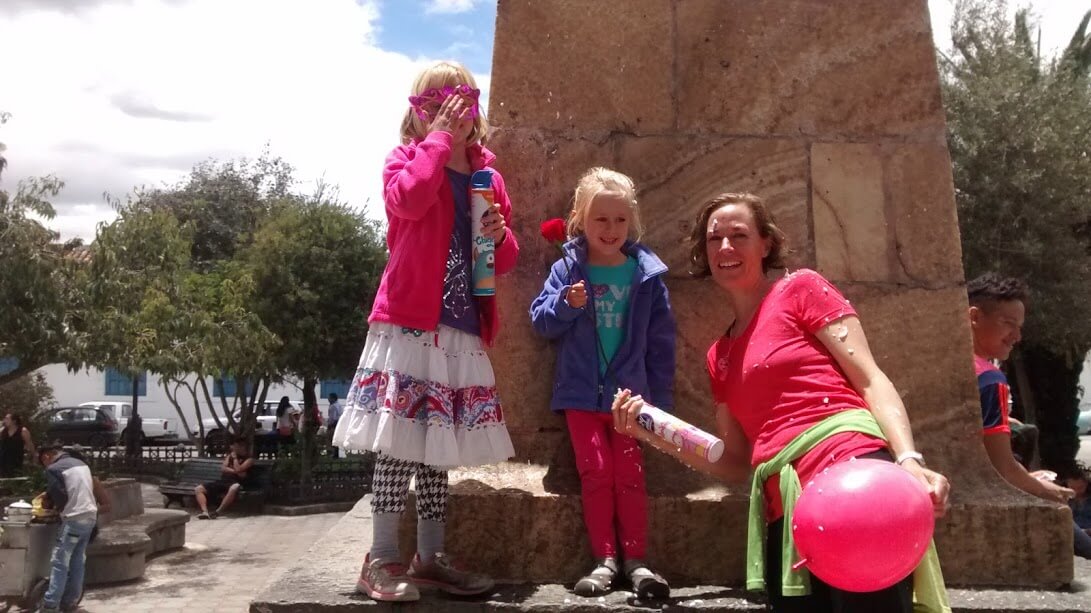
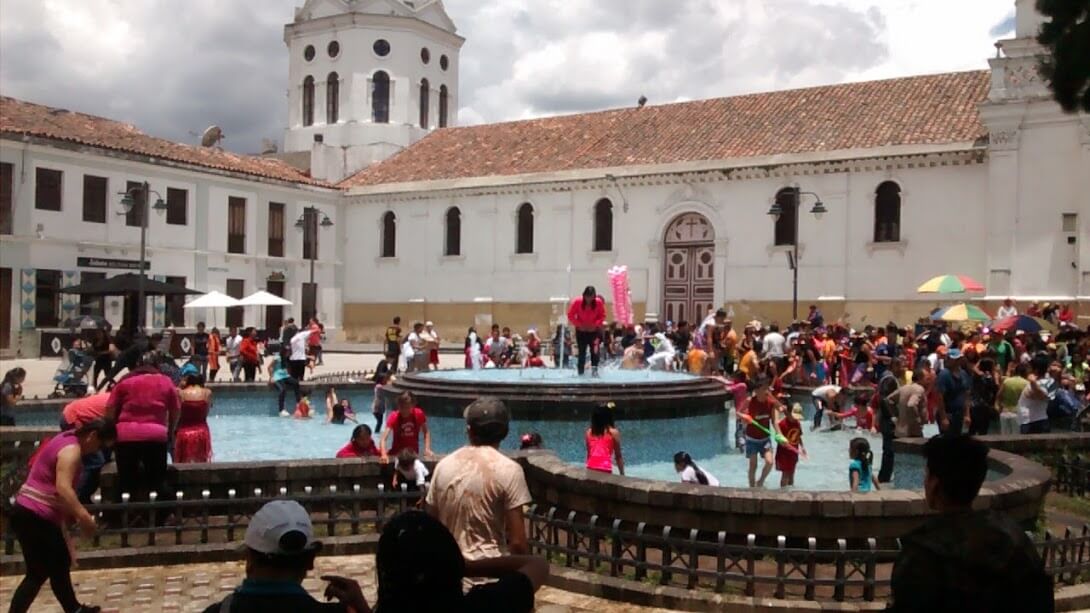
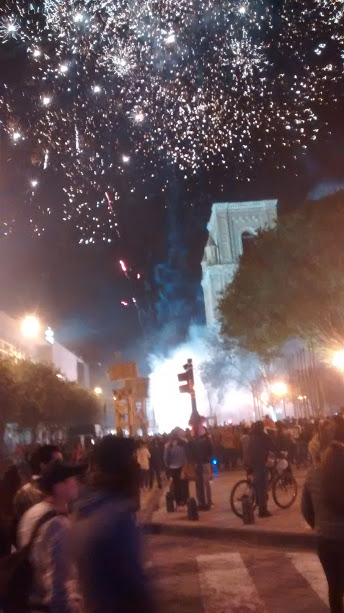
5. Q: What Do You Do? A: I Work on a Computer
Although there were plenty of expats (i.e. foreigners living abroad) in Cuenca, a family living abroad long-term still raised a lot of curiosity from locals. Inevitably I would be asked about work. I can only assume they wanted to know how we paid for our life there.
Although I talk openly about money and financial independence here on the blog, it was a little more uncomfortable in that context to say I own and supervise the management of 90 rental properties! It was much simpler to say “I work on a computer in my apartment.”
The answer seemed to satisfy people. And given that I wrote for this blog and my Retire Early With Real Estate book (coming in August 2018) nearly every day, it was true!
6. Rich Experiences Result From Putting Yourself Out There
When we arrived in Cuenca, we didn’t know anyone. Rather than being intimidating, we found it to be exciting. But we learned that we had to put ourselves out there, get involved, and reach out to others in order to have rich experiences.
For example, before even arriving we got involved in Facebook groups with other expats living in Cuenca. We found activities and common interests (like parenting, Ultimate Frisbee, and running) that connected us with people. This led to some long-lasting friendships with amazing people.
Another example happened one day when I was walking through the park. I noticed a man shooting a basketball by himself. I love basketball, so I decided to take a chance and start rebounding for him. We struck up a conversation, and he told me about a good pick-up game on Saturday mornings. It was only 2 blocks from my apartment.
This pick-up basketball game was one of my favorite activities each week. I met interesting people, learned a full arsenal of cuss words and slang in Spanish, and had a lot of fun. It even led to me playing in a basketball tournament with new friends.
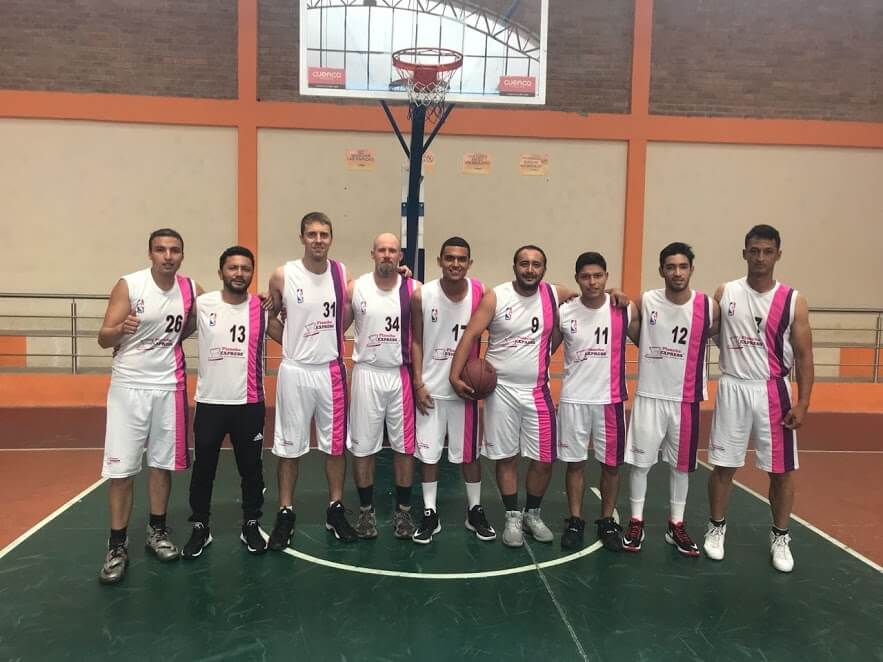
I have found this pattern to work the same in many contexts, whether personal, real estate investing, or other projects. You have to reach out to people and put yourself out there in order to experience the results you want.
7. Choose Housing Near Parks, Green Spaces, & Trails
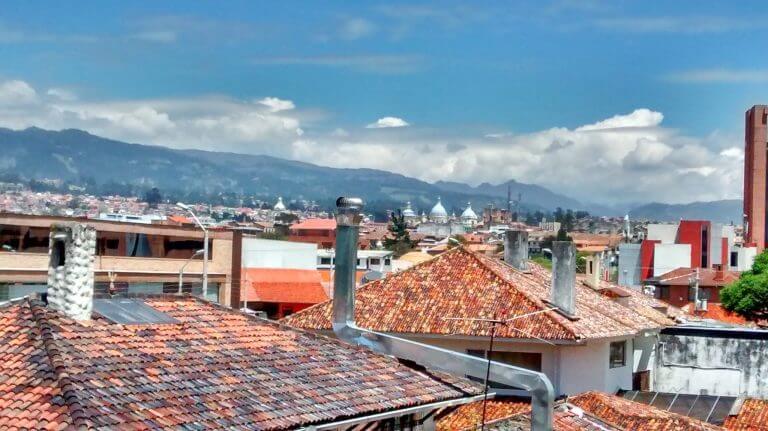
We strategically chose our apartment in Cuenca because of its location. It was a couple of blocks walk from Parque de la Madre (Park of the Mother), a nice park with playgrounds, a track, exercise equipment, and green space. We were also within walking distance to two beautiful riverside parks with trails.
This location turned out to be an excellent choice. Proximity to green space, parks, and trails made a huge difference in our quality of life.
The choice also reinforced my side-hobby of working to get a system of greenway trails in my hometown of Clemson, South Carolina (The Green Crescent Trail). If you are a public official or concerned citizen of any municipality, consider the positive long-term investment of public spaces. Other than the basics of infrastructure and safety, I can think of few better long-term public investments.
And for all of us who are real estate investors, be sure to buy properties near parks and green spaces. Your tenants and your bank account will thank you over he long run!
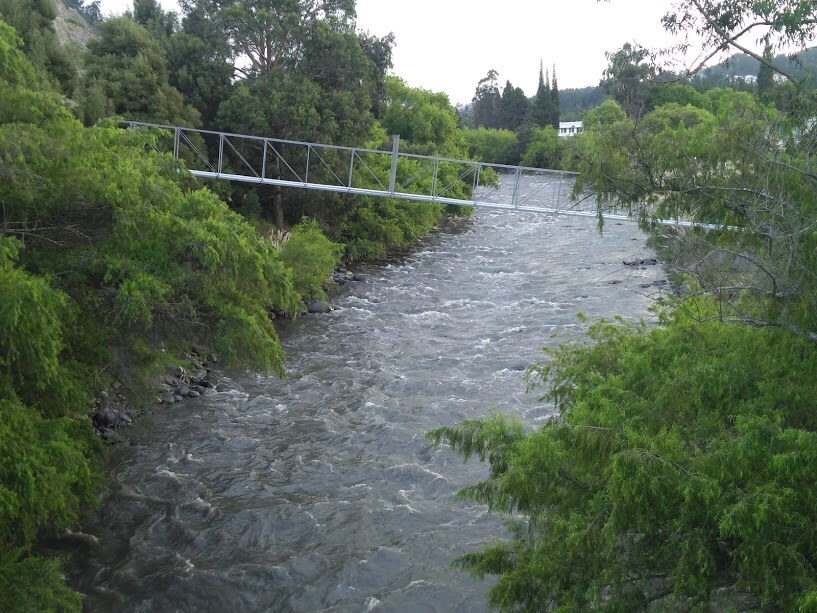
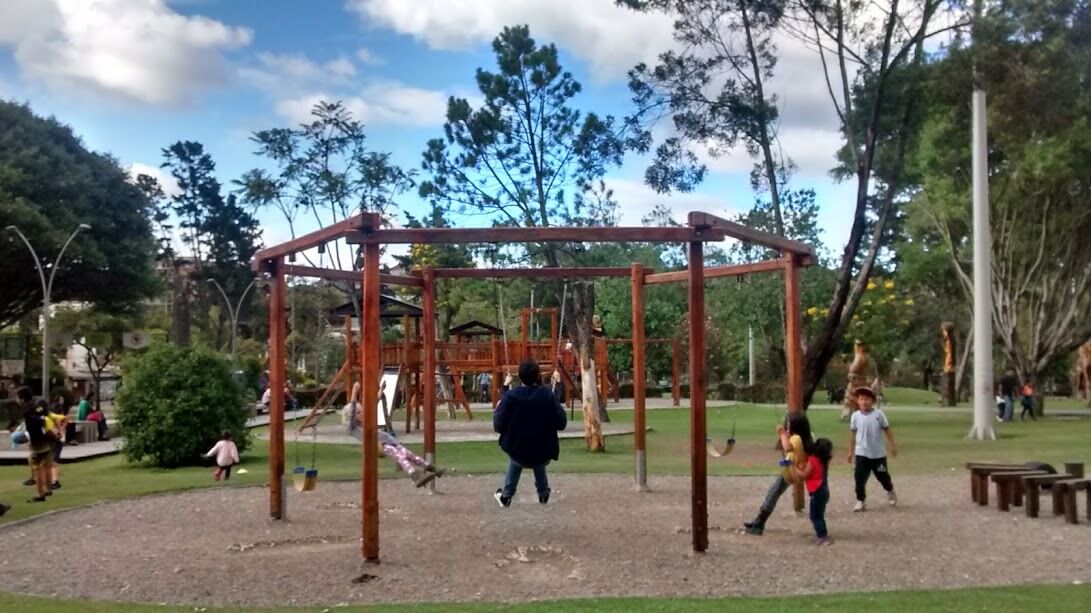
8. Car Alarms, Barking Dogs, and Electrical Fences
When Americans visit many parts of Latin America, security systems for cars and homes stand out. It’s rare to go an hour without hearing a car alarm start beeping. It’s also rare to go to sleep without being serenaded by the song of multiple barking dogs. And almost every home or apartment is surrounded by a tall wall topped with an electric fence or sharp glass.
Isn’t this disconcerting? At first, yes.
But after a time we got used to them all. It was just a part of life.
And by the end I forgot about falling asleep to crickets and owls and instead embraced dozing off to alarms, barks, and sirens.
9. Technology Makes the World Smaller
In 1999 I lived with a family in Germany as part of an exchange program. While I was there for a few weeks, I remember feeling completely detached from my life back in the US. I did call home once or twice and send a couple of emails, but I definitely felt the distance.
During this trip to Ecuador, however, technology had completely changed the experience. I had a cell phone that worked exactly like normal from 2,600 miles away! I could message, call, and chat on social media as if I were still at home.
And as you might have read in Landlording 101, I was also able to stay involved in my real estate business from abroad. I paid bills and communicated with my team on the ground whenever needed.
So, communication and transportation technology have made the world much smaller. Our cultures worldwide will continue to mix and become closer at an unprecedented pace.
10. Real Estate Is a Classic, Worldwide Investment
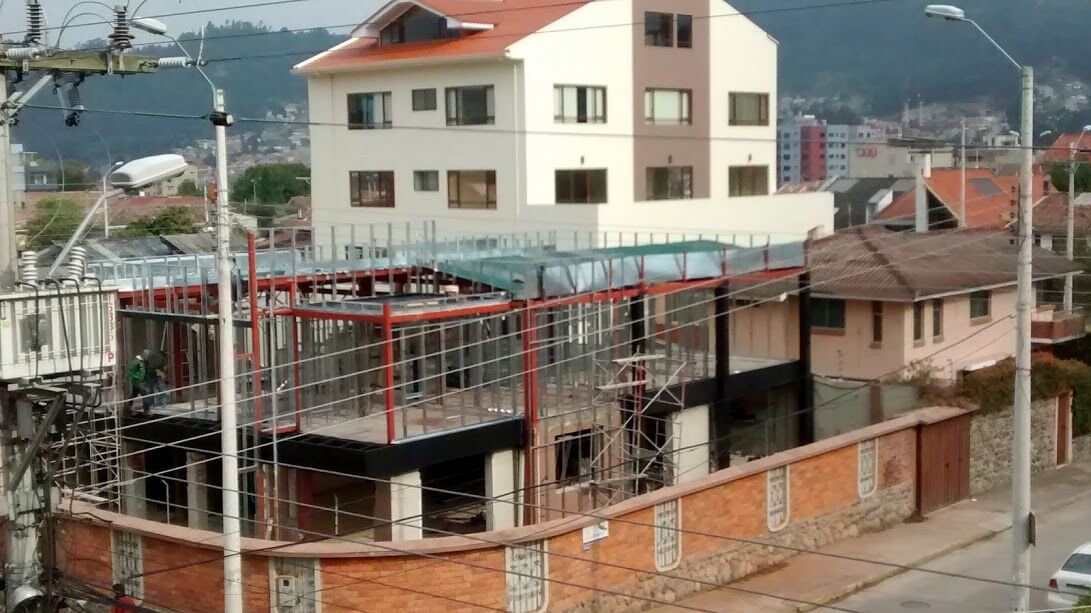
I deliberately did not do any real estate investing in Ecuador while living abroad. See my section above on simplicity!
But I am always curious. So, I enjoyed talking to local people about real estate, money, and society in general. And I noticed that people in Ecuador with money chose real estate above any other investment as a place to store and grow their money.
In Ecuador, for example, many investors vividly remember an economic crisis in 1998 – 1999. During that time, the country experienced massive inflation and bank deposits being frozen for a year. Eventually the native currency (the Sucre) was replaced by the U.S. Dollar as a first step in a painful economic recovery process (which has actually worked quiet well by this point in 2018).
But public confidence in banks, the federal government, and corporations isn’t taken for granted in Ecuador or many other countries around the world. I’m sure this is part of the reason that you receive a 9-10% interest rate for an Ecuadorian bank certificate of deposit (aka CD). But rather than bank accounts or corporate stock, real assets like a home, a rental property, or productive farm land are seen as more safe investments.
I don’t foresee major economic issues in the U.S. like the Ecuadorians experienced in 1998 – 1999. But there is no doubt we’ll experience some sorts of shocks, recessions, and problems in the future. And I have confidence that real estate bought with solid fundamentals of location and financial analysis will prove to be a good long-term investment.
11. Humility and Humor – the Key Virtues of Travel and Life
I was continuously humbled while living abroad. The more I learned about different ways of living and thinking, the more I realized I still had a lot to learn. And this child-like feeling was both intimidating and wonderful.
But being like a child also requires some humor (particularly aimed at yourself).
For example, I remember one of my many mistakes practicing speaking Spanish. I was at a small cafe, and I thought I was asking for coconut juice (jugo de coco). But instead I asked for cocaine juice (jugo de coca)!
Oops!
Learning languages and traveling in general are an endless process of making a fool of yourself. And the only reasonable reaction I found was to just be humble and laugh.
12. Discomfort Leads to Growth
As I explained in the previous insight, learning a foreign language can be uncomfortable. Being bad at something isn’t fun, especially for adults. But we must be bad at something before we can grow and get better.
Whether it’s learning a language, navigating a new culture, starting a new business, or investing in real estate for the first time, discomfort is a natural part of the process. Leaning into that discomfort is the ONLY way to grow.
I had many times where I considered turning back from my own discomfort. It would have been the easier thing to do. But I’m SO glad I kept going. All of my growth, satisfaction, and rich experiences in Ecuador were found on the outside of my comfort zone.
13. Trust Between People is a Precious Treasure
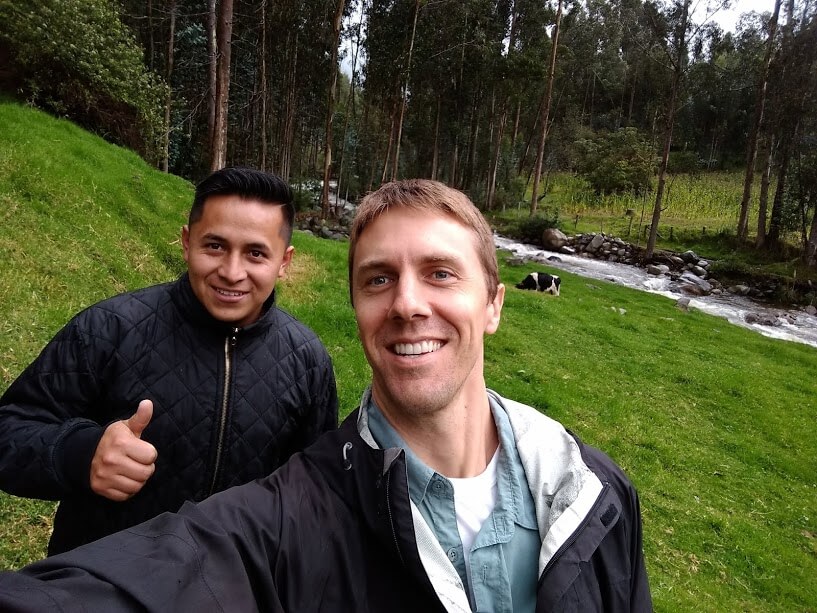
Each week in Ecuador I had 1-1 Spanish lessons with an awesome local guy named Miguel. Basically we had conversations for 2 or 3 hours at a time so I could practice listening and speaking Spanish.
During many of our conversations, we talked about entrepreneurship and real estate. I’m afraid I might have ruined Miguel from being satisfied at a regular job for the rest of his life!
Sometimes we talked about specific ideas he could use to get started as an entrepreneur with little capital. For example, I suggested talking to property owners to see if he could lease their property and then sublease to visiting tourists on AirBnb. He had excellent English, and I thought he could leverage that strength.
But his objection was typically something like “I don’t think I could get someone to do that. I’m not sure they would trust me.” I usually answered that trust is difficult to earn. So, of course it wouldn’t be easy. But that difficulty makes trust even more precious.
Trust is the glue that holds together real estate deals, business partnerships, marriages, and even societies. Without trust between people, everything would fall apart.
This realization made me appreciate the trust I’ve built between my own family and business colleagues. And it made me more determined to uphold and reinforce that trust by continuously earning it with my actions.
[I highly recommend the book The Speed of Trust: The One Thing That Changes Everything if you’d like to improve in this area.]
14. Travel Through Your Children’s Eyes
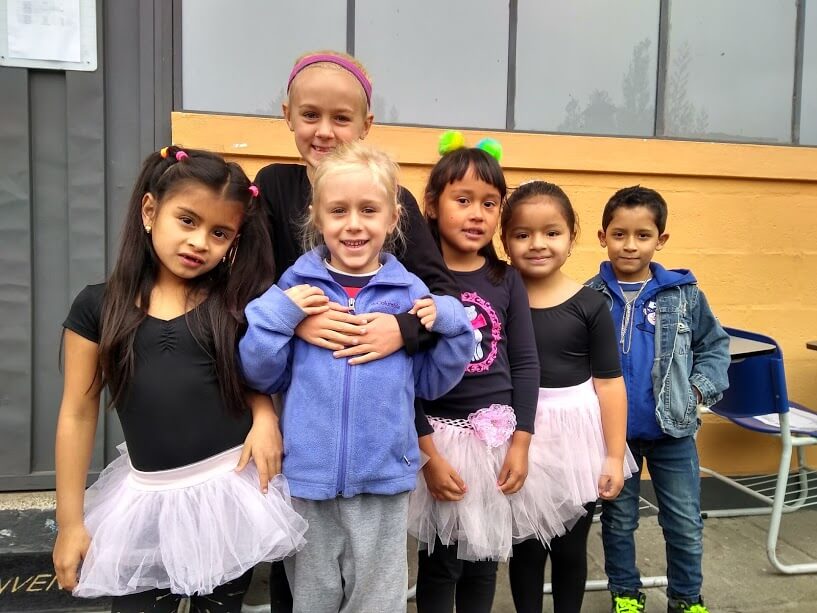
I have often hear people say they’d travel more if they didn’t have children. It’s just too much hassle.
Our own personal experience traveling with children wasn’t always easy. But it was worth all of the trouble. And it became much easier when we slowed down our pace of travel and shifted priorities to meet the needs of our kids (like always finding play grounds).
Because of this travel, our children got to learn a new language and culture at a young age. They also got to spend a lot more time with mom and dad than they would have in our normal, hectic lives back in the U.S.
And my wife and I received the gift of experiencing travel through the eyes of our children. It was a refreshing, exhilarating experience that we’ll never forget. And we connected with many parents and other local people because we had our children along with us.
15. A Slow Life is a Luxurious Life
I don’t want to hurry it. That itself is a poisonous twentieth-century attitude. When you want to hurry something, that means you no longer care about it and want to get on to other things.”
– Robert M. Pirsig, Zen and the Art of Motorcycle Maintenance: An Inquiry Into Values
What is the best thing money can buy? Big houses? Fancy stuff? Vacations?
I’ve found that the best luxury in life is slowness. Living life at a more deliberate pace is like a holiday meal with family. You savor every bite and every conversation.
Poverty, by this definition, is going so fast that you can’t appreciate your life experiences. Why must life be a race where we win by getting there faster? What’s the prize at the end of this race?
I prefer to use money to buy large blocks of slow, wonderful time. It’s better than the most expensive luxury car money can buy.
16. Make Time For People
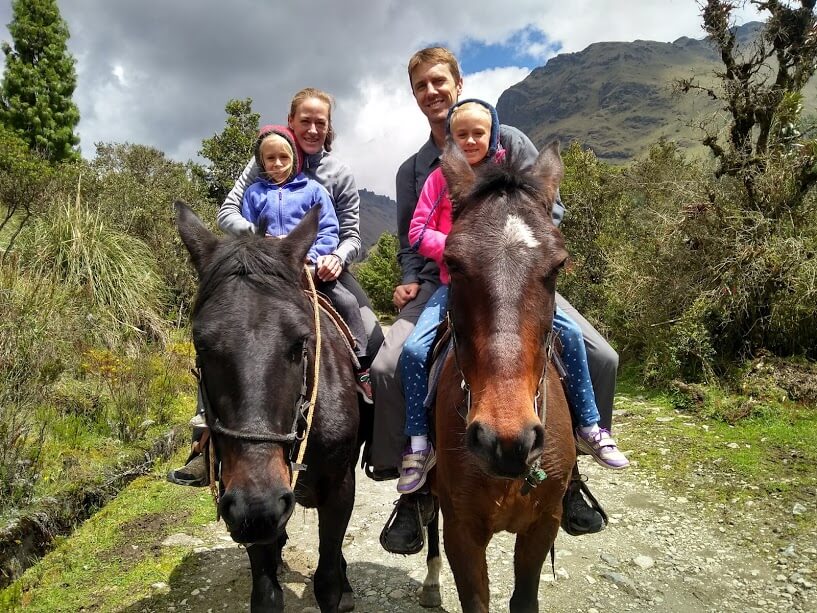
Within those luxurious blocks of slow time, you get the opportunity to connect with people. In the book The 7 Habits of Highly Effective People, the author Stephen R. Covey reminds us that with people, slower is faster. Efficiency is for machines and business systems. People, on the other hand, don’t need efficiency; they just need your time and your presence.
I have known this intellectually for a long time. But this 17 month trip to Ecuador reinforced the importance of making time for people.
I had the luxury of eating most of my meals with my family and putting my kids to bed each night. The magic of being a parent and spouse seems to happen during these “ordinary” times. It’s the innocent question, the off-hand remark, or the unspoken facial expression that deepen your understanding and connection with the people you love most.
Fortunately the Ecuadorian and Latin American culture supported this prioritization of time with family. When you stroll in the park on a Sunday, you always see multi-generational families spending time together and enjoying one another. Of course, no society is perfect. But I think we Americans could learn a thing or two from our Ecuadorian friends.
17. I’m Hopeful and Optimistic (Despite the World’s Problems)
I consider myself a realistic optimist. Yes, the world has its problems. It would be naive to ignore the challenges we face politically, economically, and socially.
But it’s easy to lose perspective watching the daily doom on the news. The world has actually made a lot of progress, and I think that trend will continue.
There are decent and kind people in Ecuador, the U.S., and around the world. These people live in the same towns as the corrupt politicians, the dishonest business people, the racists and bigots, and the criminals that make the news. My experience is that the decent and kind people far outnumber the others if you just look below the surface.
And psychologists such as Steven Pinker have data that gives us even greater reason for optimism. In this fascinating 18-minute TED talk (or his book The Better Angels of Our Nature) he shows statistic after statistic to document that our world is safer, healthier, wealthier, and happier than it’s EVER been in the history of human beings.
Better than it’s ever been? Really? That documented reality seems hard to believe if your world view is shaped by the daily news.
But instead of sound bytes, I prefer to get my worldview by traveling more, meeting real people, and making a judgment for myself. This hasn’t made me complacent or satisfied with the injustices and imperfections that obviously exist today. Instead, it’s made me more motivated and hopeful because clearly efforts by ambitious, smart people have worked in the past!
So, back to the big picture mission of this website. If you and I can solve our finances and spend more time doing what matters, we too can make our impact on the world. And that is really something to be hopeful and optimistic about!
Have you traveled to other countries? What experiences and lessons stood out most to you? Do you have any questions or comments about my experiences in Ecuador? I’d love to hear from you in the comments below.
If you’d like to dig deeper into the details of our Ecuador experience, my wife and I kept a personal travel blog at openroadcarsons.com. We are still behind updating it, but you can get a good idea what our day-to-day life was like.
Get My Free Real Estate Investing Toolkit!
Enter your email address and click "Get Toolkit"
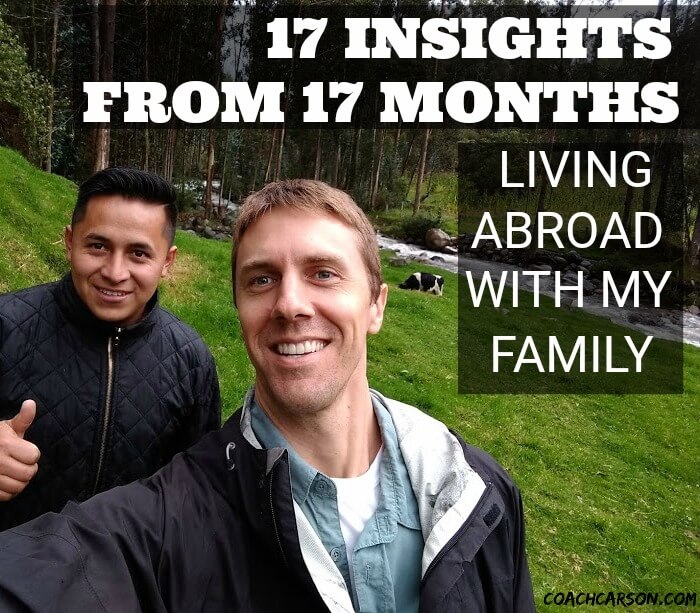
Man, you and I are going to need to get together for a beer at FinCon and talk in depth about this experience! A lot of this sounds like what I’m expecting in Panama – I’m sure there will be a lot of similarities along with some minor differences. Regardless, living in another country for a year and half probably opens up your eyes a lot more.
Great post!
— Jim
No doubt, Jim! I look forward to that conversation. And you are going to have a great adventure in Panama, I’m sure. It was certainly one of the best decisions we ever made as a family.
Thanks Chad, you make some great observations about consciously choosing the lifestyle we seek.
Migrating (temporarily or otherwise) certainly forces those decisions, a clean slate. I definitely remember the having to throw myself into things to become established and build both a social life and support network.
It is certainly hard, but after about six months you cease feeling like a Martian and start to belong. A rewarding experience everyone should try at least once!
I like your analogy of feeling like a Martian! Lol. So true. But the more you continue to put yourself out there and do activities that you enjoy anyway, the more a community builds around it.
Great article. I think this experience was one of the best gifts you could have ever given your daughters. You win Dad of the Year!! They’re going to cherish this for the rest of their lives. Memories are priceless 🙂
Agreed, Nina. We’re thinking the experience will either be awesome for the kids or totally screw them up. Not sure which yet! But there’s no doubt we got amazing memories and time to together. And that is priceless for sure.
How did the kiddos handle the language, and did they have any prior exposure? Our 4yo is in a Spanish/English preschool, and we wonder how she’d do if we lived abroad in a Spanish speaking country.
Good question, Chris. My wife teaches Spanish in the US so she gave them a few lessons. But I’d say they had 20 to 30 words and not a lot of enthusiasm for it. So, your kid is probably ahead of ours with a dual language school. We’d love to find one like that now to maintain their Spanish skills.
No matter what, the first few months could be rough because it’s like learning quickly to swim in the deep end. But we had a supportive school and we also took supplemental lessons on the side to increase their vocabularly and confidence. After 4-5 months, it got much better. And by 10-12 months, they were both fluent.
Chad, I’m glad you took the trip. I can see it really expanded your horizons. Your children will also never see the world the same again. Be well. P.S. Get ready for reverse culture shock, my friend……
Yes, the reverse culture shock is coming in full effect. The first one has been driving everywhere! Ugghh! Self driving cars can’t get here fast enough.
Give it time. It will take longer to readjust than you expect. So just be patient ;).
Hi Chad,
Amazing post! Thanks for taking the time to write when the experience is still so fresh. I’ve been a long time reader but haven’t participated much in the comments. I love how detailed and thoughtful your articles always are. I really appreciate the attention you give to the WHY of FI as well as the HOW.
Are you still speaking at Camp FI Midwest this summer? My husband and I are really looking forward to the weekend. Or I should say, I’m really looking forward to it, he is cautiously interested 🙂
Thanks!
Hi Britt! Thank you for taking the time to comment and for following my blog. It means a lot to have you along for the ride!
And yes, I’ll be speaking at Camp FI Midwest in August. Glad to here you and your husband will be there. And there’s always room for the cautiously interested:) It keeps us grounded!
Hi Chad! You trip sounds incredible. I hope to do similar things with my future family one day!
Go for it! It starts early with little financial preparations (like saving money) and then continues with beginning to day dream about where you want to go and what you want to do. Best of luck!
Welcome home Chad! LOVED the article and you had me laughing at some parts. I sent a link to some friends, Chad and Sara Bartlett, they leave this summer to travel with their family and I think reading this article would definitely answer any questions about it. Looking forward to seeing you at one of the meetings in the future!
Thank you Jack! Good to hear from you. And thank you for sharing it with your friends. What an exciting time for them getting ready to leave with their family.
Thank you for sharung these thoughts/ experiences. I enjoy all your different types of post because of the thoughtfulness you show. And humility. (Too many bloggers, especially the FIRE crowd, are smug, self-righteous, and fail to recognize nuances. Takes away some of the pleasure or value in reading them. But that’s a topic for a different time!)
What a wonderful adventure your family has had. I, too, have the opportunity to live something similar, and I. An attest to the lessons you share here. Points #1, 12, and 16 especially resonated– perhaps because of the self-inventory I have been doing recently. Thank you for the sincere, thoughtful and thought-provoking piece once again.
Thank you for reading and for your kind words, Patsy. As I said in the post – life tends to humble us all one way or the other! I’m glad my own humbling has been relatively tame:)
I’m curious about your own adventures and experiences. Are you living in another country? Any other insights you’ve found that would be helpful to me and others?
The trip looks amazing, and this article is filled with so many pearls of wisdom. A simple life = a good life, that can’t be said enough. A slow life is a luxurious life, your kids don’t care about the car you drive or the clothes you wear, just the moments you get to share with them.
Thanks Pat! So true – kids don’t care about all that stuff. They just want you to play or hang out with them!
I love it!! We, in our family, talk about these types of things all the time.
People are people is a big thing that we’ve learned through our travels. It doesn’t matter where. They all want the same things and are mostly out for good.
What a great experience and adventure!! We’re jealous and want to pattern our life in a similar way. Amazing, thanks for sharing!
Thanks for stopping by and sharing your own insights. I also like your idea of eating waffles and having these kinds of conversations on Wednesday mornings! We didn’t eat Waffles in Ecuador, but the weekly morning walks and breakfasts with my wife were one of my favorite parts of the whole experience.
Heck of a post, Chad. Insight number 12 really hit close to home. “Discomfort leads to growth”. I know your time in Ecuador probably didn’t start out easy, but you were able to live there for 17 months. That’s amazing. It also has me wondering what things I can do to get help myself grow even more.
Thanks Jason! Always good to hear from you, bud. I’m with you on the discomfort part. If it were easy, everyone would do it ,right? Like you I’m trying to continually wonder what I can do to push the edge and help myself grow.
Thanks for writing this up – great stories – glad you got to do this with your family! I’ll add it as a discussion topic for when we get you on the podcast. (It will happen 🙂 https://www.newretirement.com/retirement/topic/podcast/ )
Lol. I can’t wait to talk. Thanks Stephen.
Fantastic overview of you and your family’s extended overseas adventure. Not making me any less likely to do something similar in the future. You guys (or guy and gals, more accurately) seemed to do a great job taking advantage of so many life lessons, not to mention language lessons, while away.
Welcome back, and thank you for sharing your inspiring story!
-PoF
Thanks Doc! I hope you continue your own family travels. I can only speak for myself, but it’s been the best investment of time and money we can imagine.
Great article as always! What a great summary of you and your adventure in Ecuador! I’m not sure I have the guts to eat Guinea Pigs. I have to admit, one of the reason why I want to retire early and have passive income is so I can spend more time with my family, travel, and discovered other hobbies. To me, you’re living the rich life. Thanks for sharing!
I wasn’t super-excited about the Guinea Pig meal either. But it came so highly recommended!
Thank you for reading and for taking the time to comment. And I look forward to following your own progress to more time with family, travel, and other hobbies that matter to you!
Such an awesome post! My favorite point is the first one – people are people. When we went to Europe last summer we experienced the same thing. Yes, cultures and traditions are different, but when it comes down to it we are all just trying to find happiness and satisfaction in life.
It’s a refreshing revelation to discover that when traveling, isn’t it? Makes the world seem like a much smaller (and more friendly) place.
A thoughtful and thought-provoking post Chad.
Welcome back to the US, and I hope to make it to Cuenca myself one day!
Thanks Brian! I know you have plenty of travel adventure stories and lessons of your own. We’ll have to meet up in person sometime so we can swap them!
I love this! I’m not sure when I subscribed to your newsletter, but this one caught my eye!
We are a family of 6, currently in Mexico. We have spent some time in Ecuador (Cotacachi/Otavalo), as well, and would love to return for a longer stretch. Just curious how you were able to stay for 17 months/how you had an extended visa?
Hey Keren, thanks for reading and commenting! We love Mexico as well, so I’ll have to check out your blog and family’s adventures.
We got a professional visa, which was a process on it’s own. But basically it required having a US college degree, completing a lot of paperwork (some in US some in Ecuador), paying fees, and making a lot of trips back and forth to the visa government offices. I think the laws changed some right after we applied, so there may be a few differences. But it gets you 2 years and then you can request longer.
Let us know if we can help!
Great post Chad. Really inspiring and motivating. Was it difficult to enroll your children in the local school? And how did you choose one? Do you think they will be behind or ahead of their US friends when they go back to school academically? (I know they will be way ahead from a language and cultural perspective!)
Thanks Paul! I would say the biggest difficulty was finding a school that we liked and that had openings. We found a couple of private schools that fit that description, and after that it wasn’t difficult to enroll (even in the middle of the year). We were wanted a supportive, safe environment of course, and we also wanted somewhere that would help them along with spanish early on. We didn’t end up getting that much extra help for our older daughter within the school, but she came along ok anyway. The preschool for our younger daughter was very nuturing and wonderful.
We did regular math and reading in English at home. But they also got some decent math instruction in school as well. We aren’t as worried about catching up with particular curriculum even if they did fall behind. I think they would catch up ok, and the experience was well worth it.
Great article Chad. We all thoroughly enjoyed meeting your family and becoming good friends during your time here. And, thanks to #9, I know that we’ll meet again.
I love this post. It’s really thoughtful and insightful. I especially liked the the last insights #13 through #17. I found these to be very true throughout my travels.
I have a 2 month old daughter and we plan on having one or two more. One of these days I would like to slow travel like this and see the world through my children’s eyes 🙂
Very good retrospective, Chad! I’m sure this experience will stick with your family for a long time. I was fifteen when I got to experience an adventurous, non-standard, lifestyle living on a sailboat and sailing around California and Mexico for a year. That year had a huge impact on me and I still look back on it happily. I hope your girls can say the same years from now! We really enjoyed getting to know you guys while we were in Cuenca. Stay in touch and keep up the great content!
Thanks for sharing Chad! This was so heartwarming and relatable. People are people is a big theme I’ve learned in my travels to Japan. The more I learned Japanese (and made a fool of myself along the way), the more I realize people, no matter where they are from, have the same deep emotions and desires. I met my closest friends abroad simply going to hiking and bar Meetups. It’s definitely a must to get outside of your comfort zone and reach out and meet strangers all of the time. Great blog post! It seems like you need a 2nd title, Nomad Carson.
Well done Chad! Thanks for writing this and so happy for you guys and the experience!
Fascinating story Chad! I recently spent a month in Ukraine & 3 weeks in Turkey and will never forget those experiences. Fortunately I have an IT job that allows me to work remotely. I’m considering spending a month in Ecuador & would like to make Cuenca my home base. I just wanted to thank you for publishing this article. There’s so much misinformation & hype out there regarding destinations for people considering becoming ex-pats like myself. It’s truly refreshing to read something from someone who doesn’t have a hidden agenda. I’m really looking forward to checking out your Open Road website. You’re a true inspiration!!